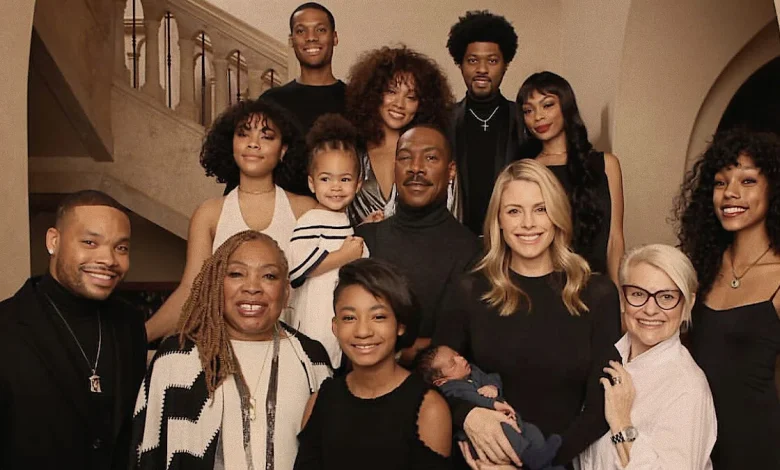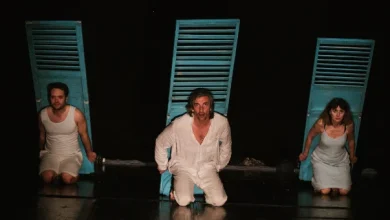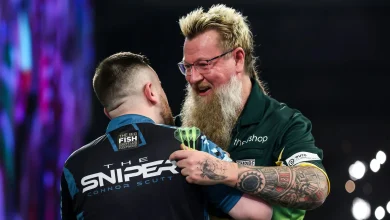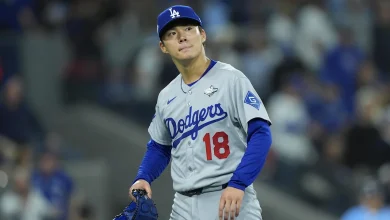Yes, You’re Going to Be Seeing a Lot More Eddie Murphy Soon

Fans know Eddie Murphy from Delirious, Raw, and five decades of unforgettable characters. Being Eddie, a new documentary from two-time Oscar winner Angus Wall, offers something rarer: a glimpse at the man himself. With candid insights from Murphy and those closest to him (including Adam Sandler, Chris Rock, Dave Chappelle, Jamie Foxx, Jerry Seinfeld, and more) the film traces how he rocketed to fame, stayed centered, and recharged his creative energies on his own terms.
“Through the documentary, people get a better understanding of how I got here. A young person might think I just walked out of heaven into Hollywood, but that’s not quite how it happened,” Murphy tells Tudum. “For the first time, they’re getting a little peek at me.”
Here are four things we learned from Being Eddie, featuring reflections from Murphy himself.
Eddie knows that he’s one of the few exceptions in the canon of stars who started young.
Packed with early SNL footage from Gumby and Buckwheat to “Mr. Robinson’s Neighborhood,” the documentary shows how quickly Murphy’s star rose after he joined the show in 1980 at 19. Revisiting those years, he puts it plainly: “I was really, really young. I’d get on Saturday Night Live — and I’m a teenager. It’s a bunch of career-defining stuff that happened really early on, when I was just a baby.”
Seeing those early days play out onscreen made him take stock of the hazards that came along with celebrity. “I had to navigate that minefield,” Murphy says. “If you’re young, they put the whole world at your feet and say, ‘You could have everything, you could do anything, you could go out with any chick, you could go anywhere.’ That fucks most people up.”
What lands hardest now is that he made it through when so many didn’t. He tells himself: “Wow, you went through this minefield when you were just a baby, and you made it to here,” he says. “All my contemporaries are gone. Michael [Jackson] and Prince and Whitney [Houston] and Luther [Vandross] … they’re all casualties of this business.”
Sobriety, self-love, and prayer have kept him steady.
Being Eddie underscores how, Murphy cut his own path early. Even around hard‑partying stars like Rick James, John Belushi, and Robin Williams, he drew a clear line: He never tried cocaine, doesn’t drink, and doesn’t smoke — and didn’t even try marijuana until he was 30. That restraint ties back to a deeper code that he describes in the doc as “his biggest blessing.”
“I love myself,” Murphy says. “Always loved myself. That’s the most important thing, that’s one of the reasons why I didn’t destroy myself … I had all the temptations and all the madness and all the stuff that anybody has around me, but I always loved myself.”
When the noise gets loud, he returns to a simple, lifelong practice. “Prayer is the only really powerful thing you can do,” he says. “That’s always been a part of my life. I’ve always been centered spiritually, grounded spiritually.”
Eddie has struggled with OCD.
In the documentary, Murphy traces where his mental health and his comedic instincts intersect. “Sense of humor is ultimately an acute sense of proportion,” he says. “The funny person notices stuff first.” He goes on to suggest that the sharp sense of detail in his comedy might be linked to compulsive behaviors he’s carried since childhood. “I used to have that OCD when I was a kid — I didn’t know what that was,” he says, describing rituals like checking his stove’s gas dials every night, sometimes multiple times over the course of an hour — and talking about what it took to break the loop. “I check the gas every night still,” he says. “But every now and then, I’ll check it twice.” Now, whenever he catches himself mid‑spiral, he coaches his internal thoughs : “ ‘Nah, motherfucker, you ain’t starting that shit again. Take your ass to bed.’ ”
Eddie is a lifelong ventriloquist, and owns puppets of Richard Pryor and Bill Cosby.
Perhaps the documentary’s most unexpected props, the Richard Pryor and Bill Cosby ventriloquist puppets Murphy unboxes near the end of the film, are also its most revealing. They join foam versions of friends like comedian Paul Mooney and singer Val Young that Murphy already owned and offer a glimpse at how he plays and pays homage to his idols off camera.
As he tells it, the Pryor and Cosby puppets sprang from an idea for a bit while he was considering a return to stand-up: “I said, ‘I should get a Richard Pryor puppet.’ I was joking around, then Angus [Wall] went off and got those puppets made.” But he’s long kept puppets at home — pulling them out for friends, doing impressions, keeping the room laughing. “If Paul Mooney was around, [if] we were on vacation somewhere, then I’d pull a puppet out and Paul would go, ‘This n—’s crazy. This n— has lost his mind.’ Val Young is an old friend of mine, so I had a puppet of her made, and I’d do an impression of her.”
And while a full return to stand‑up may not be on Murphy’s immediate horizon, the doc sneaks in a tease: Over the credits, Murphy breaks out the puppets for a Pryor‑and‑Cosby bit that’s pure Eddie — affectionate, mischievous, and a taste of the act that might one day take shape onstage.
Eddie has a long-awaited film project in the works.
Murphy frames his Emmy-winning 2019 return to Saturday Night Live as the payoff to a deliberate reset. “I took off maybe five, six, seven years and didn’t make any movies,” he says. When he finally said yes to hosting, the effect was immediate. “I was rested and recharged by that energy,” he says. “I got everything back to where it’s supposed to be.”
That jolt set him up for what’s next. “I’m getting ready to do the George Clinton biopic, and I’m looking forward to that,” he says. “I’m looking forward to doing The Pink Panther. I’m doing the Shrek movies — I’m looking forward to all the stuff that I’m doing, and that’s because I’m rested.”
He also teased a passion project. “My little pet project that I’ve been developing for 10, 15 years is a remake of the old comedy It’s a Mad, Mad, Mad, Mad World,” he says of the 1963 classic with an all-star cast of comedians in a slapstick pursuit of a suitcase of stolen cash. “That’s what I really want to do, because I want to direct that one.”
From teenage fame and the minefields it brings, to the grounding power of self‑love and prayer; from talking back to anxiety to a revitalizing SNL homecoming — Being Eddie provides a rare, unguarded look at the man behind the comedy legend. The documentary is now streaming on Netflix.





